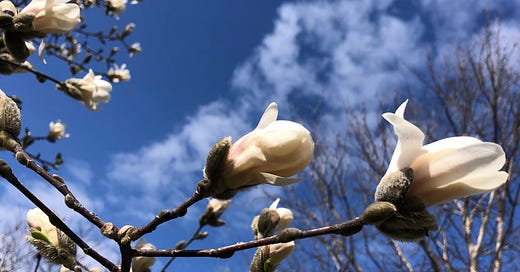On walking into what we cannot yet see
Continuing our spring series on Elizabeth Alexander's "Praise Song for the Day"
Hello, friends. Welcome back to our spring series on Elizabeth Alexander’s “Praise Song for the Day.” You can read the first post here, if you’d like.
This week, we’re looking at the next handful of three-line stanzas (tercets), which take us further into the poem and its depiction of everyday life:
A woman and her son wait for the bus.
A farmer considers the changing sky.
A teacher says, Take out your pencils. Begin.
We encounter each other in words, words
spiny or smooth, whispered or declaimed,
words to consider, reconsider.
We cross dirt roads and highways that mark
the will of some one and then others, who said
I need to see what's on the other side.
I know there's something better down the road.
We need to find a place where we are safe.
We walk into that which we cannot yet see.
Say it plain: that many have died for this day.
Sing the names of the dead who brought us here,
who laid the train tracks, raised the bridges,
picked the cotton and the lettuce, built
brick by brick the glittering edifices
they would then keep clean and work inside of.
Alexander continues here with small, ordinary images: people waiting for the bus, squinting at the sky to check the weather, a class full of students beginning an assignment. Poetry, she reminds us elsewhere, is found in the details: “what you find / in the dirt in the corner, / overhear on the bus” – perhaps the same bus that woman and her son will ride. We are all, she reminds us, simply trying to get through: each of us going about the tasks and routes that are ours.
The next stanza goes a bit more abstract, moving from actions to words: words containing different textures and ideas, words of different volumes and timbres, words which constitute a primary form of connection between humans. There are options, she seems to remind us: we can choose what we say and how we say it, and when we hear those words, we have a choice about how we respond.
Like those words, the roads in the next stanza form a path of action and purpose: exploration, curiosity, hope, sometimes fear.
Especially in a time when thousands of people are fleeing their homes because of violence or climate disaster—and after the death of a pope who urged compassion for migrants and refugees—it strikes me that people move for all kinds of reasons. The story of the United States has always been a story of movement: the seasonal movements of Indigenous peoples who lived here originally; the curious, sometimes avaricious arrival of the early colonists; forced movement of enslaved people and Indigenous people denied their own lands; and the enduring dream of those who came—still come—to this country for the possibility of a better life.
“We walk into that which we cannot yet see,” Alexander writes, which strikes me as apt for any new beginning: an inauguration, a new job or city or relationship, or the smaller opening of a new day. We humans love to make plans and forecasts, but the truth is that we know very little about the future, at least for certain. The optimism of the previous few lines mingles with the need for safety and refuge, combining in a stubborn hope for “something better down the road.”
Stanzas 9 and 10 put a finer point on where we are: “many have died for this day,” Alexander notes, honoring the labor of those who built this country. As a Black woman reading this poem at the inauguration of the first Black president, she reminded her audience: enslaved people, and others like the Chinese immigrants who built the transcontinental railroad, labored long and hard for benefits they never got to enjoy.
Sing their names, Alexander urges; honor their work and care and sacrifice. This is, after all, a praise song, and she’s highlighting the people who never got their due.
I chose this poem partly because, in this national moment, we are arguing (as we have for so long) over who gets to be an American, and what that looks like.
As a nation, we are deeply divided on who gets to claim citizenship; who gets to enter this country and stay here; who gets to enjoy the ordinary moments Alexander writes about; and who gets to decide. Especially now, it’s worth remembering that these tiny acts of ordinary life—building bridges, writing essays, taking the bus, talking to one another—make up the mosaic of a nation. And that mosaic is stronger, more colorful, more wise and brilliant and beautiful, when it includes all of us: the full range of those who are American, or who would like to be.
Poetry, as Alexander also notes elsewhere, does not make policy decisions. But it can help us shape a vision for the world we’d like to build, and the kind of people we want to be. As we walk forward into each day’s unknown, poetry—and community—can help us build a world that makes room for hope.
Thanks for reading, friends. I’ll see you back here next week for the final post in this series. As always, I’d love to hear your feedback in the comments!





